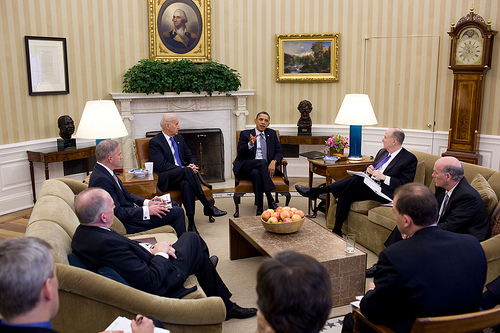Egypt: Obama Administration Torn Over Mubarak’s Exit Plan

Although the White House stood conflicted after the January 25 eruption of protests, it appears that the President’s inner circle has settled on supporting a gradual transition of power in Egypt – essentially easing Mubarak out of power. At the helm of the reform process would be Vice President Omar Suleiman, a move that some top U.S. officials fear would implicate the administration with a Mubarak-appointed politician.
The Suleiman-led transition is supported by a number of Obama’s top aides, including Defense Secretary Robert Gates, Secretary of State Hillary Clinton and national security advisor Thomas Donilon.
But opponents of this plan say the U.S. must take an outspoken, pro-democracy stance in order to retain Egypt as a future regional ally.
The Los Angeles Times reports:
On Wednesday, Suleiman warned ominously of a coup unless the unrest ended. That prompted White House Press Secretary Robert Gibbs to fire back that the Egyptians should "expand the size and scope of the discussions and the negotiations and to take many of the steps that we outlined yesterday — one of which is lifting the emergency law."
Suleiman's behavior reinforced the arguments of another camp inside the Obama administration, including National Security Council members Ben Rhodes and Samantha Power, which contends that if President Obama appears to side with the remnants of Mubarak's discredited regime, he risks being seen as complicit in stifling a pro-democracy movement.
Currently, there is no disagreement in the White House over whether Mubarak should relinquish his post.
Instead the debate revolves around four main questions, as outlined by White House Press Secretary Robert Gibbs: the timeframe for when the regime will repeal its current emergency law; how quickly power will be transferred; the prominence of opposition groups, such as the Muslim Brotherhood, in negotiations; and whether Mubarak should resign before the September elections.
In the infancy of the Egyptian unrest, the Obama Administration stressed its alliance with Mubarak, pointing to his stabilizing presence in the region on sustained peace with Israel.
But as protests swelled in Egypt, the White House began to change its stance.
The biggest question for the U.S. government remains to be how to transition a country riddled by 30 years of a U.S.-backed autocracy to a U.S.-friendly democracy.
To reach Benjamin Gottlieb, click here.
Follow him on Twitter: @benjamin_max.



